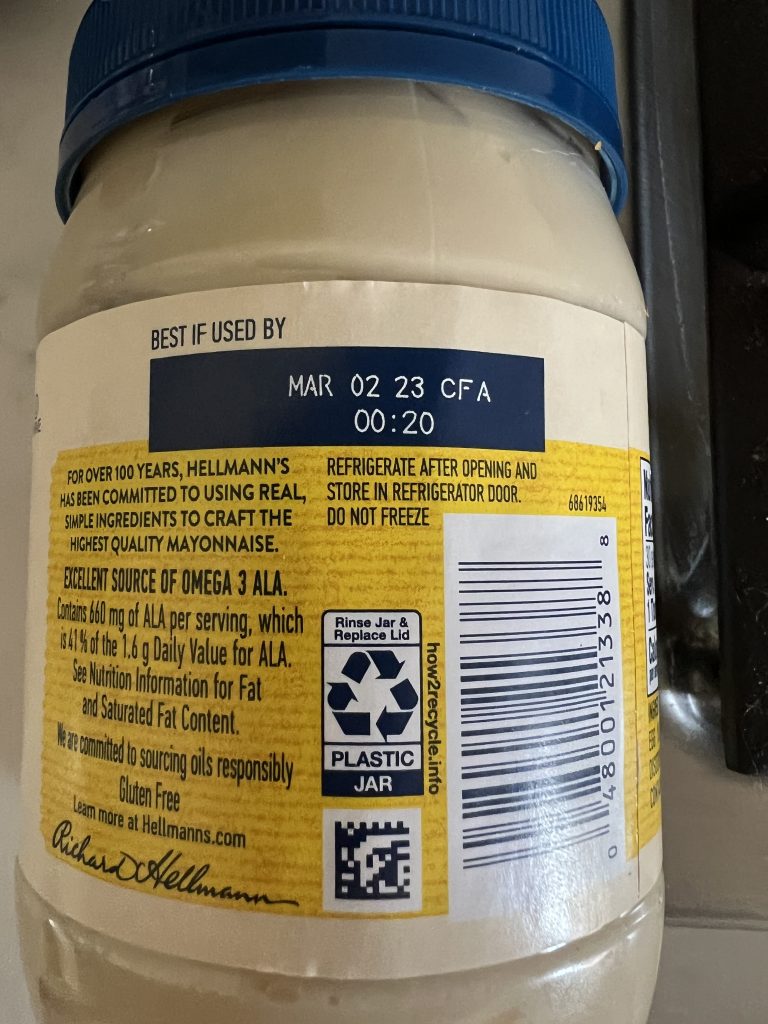The other day for lunch I knowingly made a sandwich with expired mustard and mayonnaise…not just a little past the best by date…REALLY expired. For your entertainment, I even made photos to document my bad behavior (a new definition for girls gone wild). Of course I had a tummy ache that afternoon – luckily nothing serious. But it gave me a WONDERFUL theme for today’s blog. If you’re ever wondering what the difference is in all the random date references, I have googled it for you. TLDR? I pasted the critical info here:
- A “Best if Used By/Before” date indicates when a product will be of best flavor or quality. It is not a purchase or safety date.
- A “Sell-By” date tells the store how long to display the product for sale for inventory management. It is not a safety date.
- A “Use-By” date is the last date recommended for the use of the product while at peak quality. It is not a safety date except for when used on infant formula as described below.
- A “Freeze-By” date indicates when a product should be frozen to maintain peak quality. It is not a purchase or safety date.
Back to the topic at hand – the concept of ‘best by’ dates started me thinking about how long people stay at a company and if there’s a definitive time to move on.. Many folks, including myself, stay out of loyalty. In addition, they may stay because they’re comfortable and have friends and have finally figured out the inner workings and who to go to when stuff needs to get done.
Are you past your company’s “best by” date for you? At my first job (back in 1990), the norm was for employees to be lifers. Aetna (where I was hired) was referred to as Mother Aetna. It was a company that operated as a family that cared and nurtured. When Aetna re-orged and had its first layoff, there was a great deal of the communication about this break in a relationship. Aetna had evolved. It was a corporation before but it still cared. Now it was just a corporation. Is this the evolution path for every company?
In each of my more recent employment engagements, I stayed for over 10 years. For the first 5 or so years at each I felt valued, appreciated. I saw opportunities for my personal and professional growth. Then (and this is 20/20 vision looking backward) at that 5 year mark or thereabouts I began to feel a little less appreciated.
In my mind I’m thinking I am still delivering like a rock star, why don’t I feel like I am treated like a rock star? The key to that sentence is “I feel” = my perception. This gets me to a point I made in a training of new hires – perception is reality. I am very attuned to subtle (or not subtle) messages. While I was verbally told I was valued, I was turned down for a couple of positions I applied for. I was liked and valued by my peers and my clients, but wasn’t viewed the same by management. The companies had evolved (as one would hope – we all should be evolving, not stagnating), and somehow I got left behind. Perhaps just collateral damage? My guess is that I was perceived to be part of the ‘old way of doing things’ and thus not part of the future (see what I did there? I have perceptions and there were perceptions about me).
Which brings up a harsh reality with perceptions – they’re almost impossible to change. Here’s some advice to stay on top of how you are perceived:
- First, be in control of ‘your brand’ = the perception others have of you. I recommend having a Praise file/folder that contains the successes you’ve achieved. This folder should be full of complimentary emails from clients, praise from your manager, QUANTIFICATION of your positive impact to your employer.
- Second, don’t be afraid to toot your own horn – forward that email from a client, or invite your client to send an email to your manager.
- Third, come with solutions. Managers are bombarded constantly with problems. It’s okay to vent and it’s okay to come to them with problems, but to really shine, have in your back pocket a few solutions to the problem you’ve voiced.
- Fourth, request feedback…and not just at your annual review. Ask your manager what you’re doing right and what you can improve on. If you’re turned down for a position, then ask for feedback – what skills did you lack? what was the reasoning?
- Fifth – if the feedback you’re getting is vague and/or your gut is telling you it is time to move on. Trust yourself. It probably is time to move on.
In my last class at SMU, the OBA professor had us visualize and build out a career path. My plan was to work for a few years, go back to school for my MBA and then work for a company or two, ultimately landing as an entrepreneur. I have achieved that. And the best thing is now there is no ‘best by’ date, as owner and entrepreneur (I don’t think I can fire myself).
As to ‘best by’ dates when you’re working for someone else, I would say if you stay less than 3 years then you’re viewed as a job hopper. 5+ years is great as long as you’re showing some promotion of some sort. If I had to do it over, I’d probably shorten my 10 year stints to 7-8 years. That would be my sweet spot. Like I said, everything is clearer in hindsight.
I would have LOVED to have had this advice starting out in my career. I hope it helps you.
And after the mayo debacle, I learned how to make my own mayonnaise! Click here to learn how!

